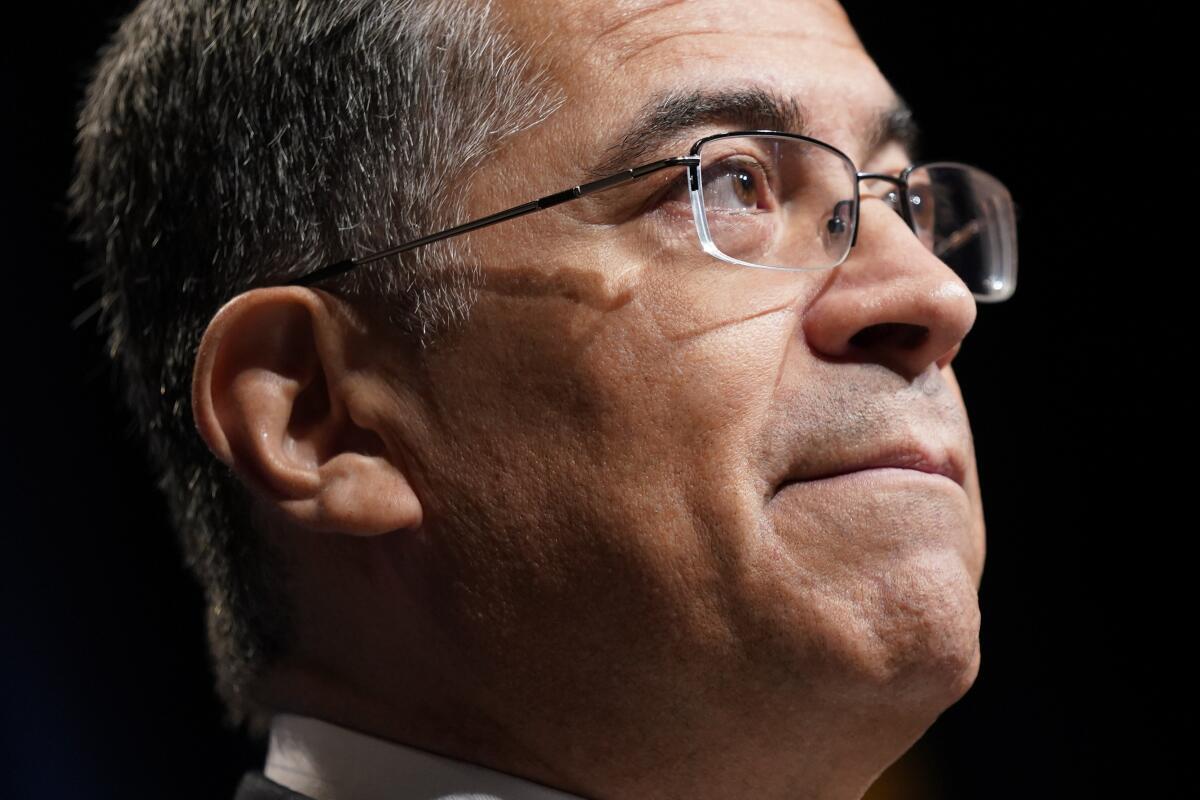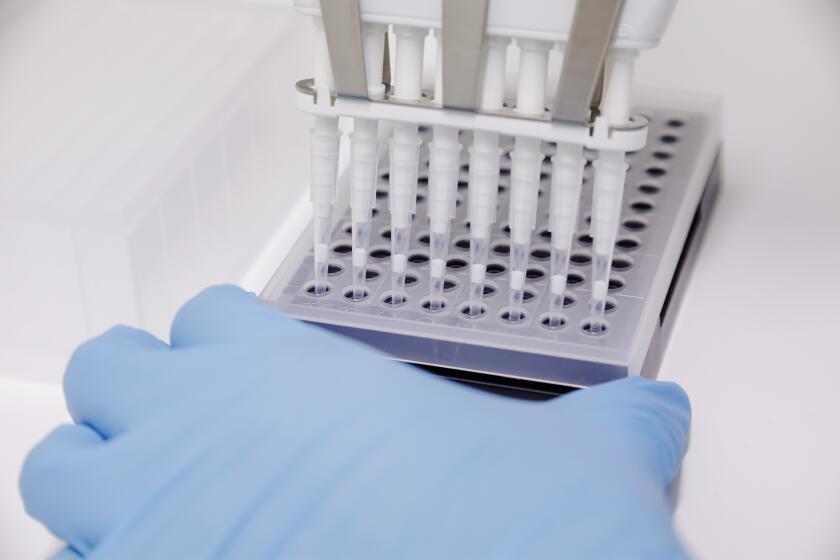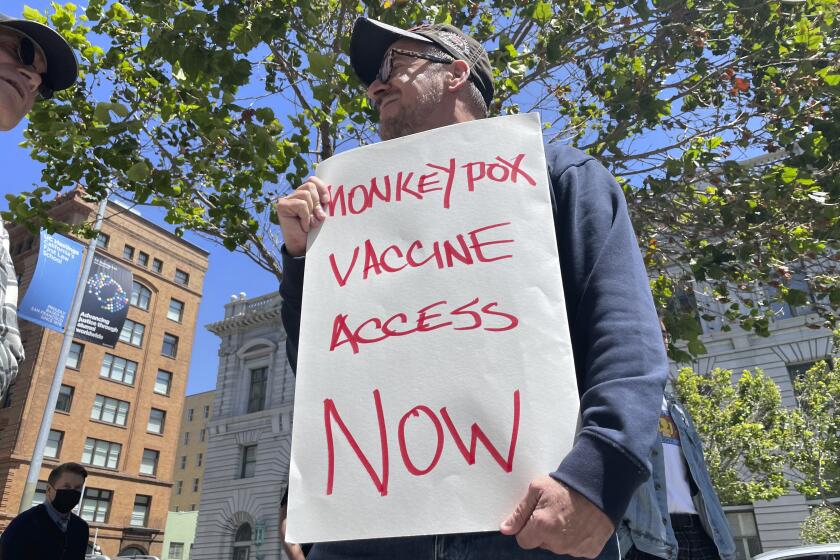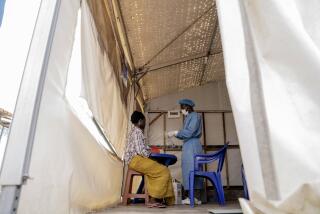Biden administration declares monkeypox a public health emergency

- Share via
WASHINGTON — The Biden administration on Thursday declared the outbreak of monkeypox a national public health emergency in an effort to raise awareness and accelerate efforts to combat it.
The move comes days after several counties, including San Francisco and Los Angeles, and states such as California, Illinois and New York declared emergencies.
“We’re prepared to take our response to the next level in addressing this virus, and we urge every American to take monkeypox seriously and to take responsibility to help us tackle this virus,” Xavier Becerra, secretary of Health and Human Services, said during a briefing with officials and the media.
Monkeypox is typically a rare disease in most parts of the world, similar to smallpox, though symptoms are sometimes milder. It is largely spreading among men who have sex with men as well as transgender and nonbinary people, though health officials warn that anyone can contract the virus through direct contact with infectious sores, scabs or body fluids, or by touching clothing or bedding used by a person with the virus.
At least five children and one pregnant woman in the U.S. have been infected, public health officials have reported.
U.S. health officials are expanding the group of people recommended to get vaccinated against the monkeypox virus.
The decision to declare a national emergency, which has been under consideration for several weeks, will allow federal agencies to direct more funding toward developing and testing vaccines and other drugs, unlock emergency funding reserves and enable the hiring of additional workers to help manage the outbreak.
But the administration, Becerra said, is holding off for now on a second emergency order that would help fast-track other potential treatments and vaccines, which under such a declaration no longer would have to go through the usual federal reviews.
The World Health Organization declared monkeypox a global public health emergency on July 23, and some state officials have done the same, including California Gov. Gavin Newsom, who issued a state-wide emergency declaration Monday.
“California is working urgently across all levels of government to slow the spread of monkeypox, leveraging our robust testing, contact tracing and community partnerships strengthened during the pandemic to ensure that those most at risk are our focus for vaccines, treatment and outreach,” Newsom said in a statement.
Gov. Gavin Newsom declared a state of emergency in California over the spread of the monkeypox virus in order to “bolster the state’s vaccination efforts.”
More than 1,300 cases of monkeypox have been presumed or confirmed in California, according to the California Department of Public Health’s most recent data as of Thursday. The state reported that 98.3% of those cases were confirmed in men, the majority of whom identify as part of the LGBTQ community.
More than two-thirds of the state’s overall infections have been reported in Los Angeles County and San Francisco. Presumed or confirmed cases in Los Angeles County — 478 as of Thursday — had climbed 56% in the last week. In San Francisco, which was reporting 397 cases as of Wednesday, infections had climbed 35% from the week prior.
Earlier this week, President Biden appointed Robert J. Fenton Jr., a longtime official at the Federal Emergency Management Agency, to coordinate the national response to the virus. Fenton, who also spoke during Thursday’s briefing, vowed to “leave no stone unturned in our efforts to combat this virus.”
But the speed at which the virus has spread, he said, is a challenge. “This is a unique outbreak, and it is spreading faster than previous outbreaks,” he said.
Before April, monkeypox was seldom reported outside Africa, where it is endemic. But a study from the New England Journal of Medicine showed that infections were diagnosed in 16 countries between April 27 and June 24. Within a month, the WHO called the expanding outbreak, which at that point had spread to 70 countries, an “extraordinary” situation.
In the U.S., more than 6,600 cases have been confirmed since May 18, mostly among men who have sex with other men. Most experts believe those figures greatly underestimate the actual spread of the virus. Testing capacity, Becerra said has grown to 80,000 tests a week, a figure that should continue to grow.
A week ago, Becerra indicated the government had done all it could in response to the outbreak.
“We believe we have done everything we can at the federal level to work with our state and local partners and communities affected to make sure we can stay ahead of this and end this outbreak,” he said in a statement July 28.
At the time, federal leaders announced distribution plans for 780,000 shots of the two-dose Jynneos vaccine, the only monkeypox vaccine currently approved by the Food and Drug Admini- stration. The doses are to be allocated to states and cities based on case numbers and the size of their at-risk populations.
Currently, the government is reportedly under- supplied in its stockpile of Jynneos. Although officials have said around 1.6 million Americans are at high risk for monkeypox, the U.S. has only enough doses to fully inoculate 550,000 individuals.
The national vaccine stockpile will increase by 150,000 doses in September, according to Dawn O’Connell, the assistant secretary for preparedness and response at Health and Human Services.
Times staff writer Taryn Luna contributed to this report.
More to Read
Get the L.A. Times Politics newsletter
Deeply reported insights into legislation, politics and policy from Sacramento, Washington and beyond. In your inbox twice per week.
You may occasionally receive promotional content from the Los Angeles Times.












